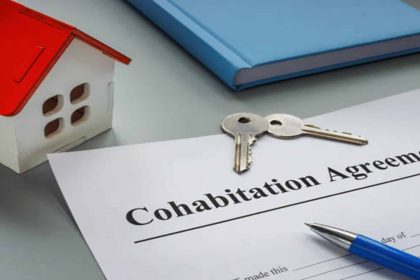
The 2016 census showed that 152,302 couples in Ireland described themselves as cohabiting. According to the summary results of Census 2022, this number has risen to 179,000 cohabiting couples, reflecting a continued upward trend in non-marital living arrangements. This growth highlights the increasing diversity of family and relationship structures in modern Ireland.
The Civil Partnership and Certain Rights and Obligations of Cohabitants Act 2010 deals with what happens if a cohabiting relationship ends.
Up to the 2010 Act, couples who were cohabiting (even for many years) acquired no automatic property rights, no rights of occupation in the property, which was their home, no financial support, no maintenance, no pension and no inheritance rights for a partner.
WHO IS A COHABITANT?
A cohabitant is one of two adults (of the same or the opposite sex) who ‘live together’ as a couple in an ‘intimate and committed relationship’.
The term is not explicitly defined under the legislation.
Courts will look at factors such as the length of the relationship, how living expenses and responsibilities are shared, and how the couple presents in public.
The Act does, however, specify that ‘intimate and committed’ means that the parties must be, or must have been, sexually intimate.
How long do you have to live together?
To be able to claim under the Act, you must have cohabited for:
- 2 years if you have dependent children, or
- 5 years, in any other case.
The period of cohabitation must be one continuous period and cannot consist of several separate periods.
What can you claim?
The Court has the power to make:
- Property Adjustment Orders can mean transferring property even where the other partner is the sole owner.
- Maintenance Orders, which can include lump sum payments.
- Pension Adjustment Orders can involve transferring all or part of a pension payment.
- Payment out of the estate of a deceased partner, even if there is no financial dependency.
- Such a payment cannot be any more than a spouse would receive in similar circumstances
In making a decision, the Court will look at:
- The financial needs and obligations of each person.
- The entitlements of any prior spouse or civil partner.
- The entitlements of any dependent child of a previous relationship.
- The duration & basis of the relationship and the degree of commitment to one another.
- The contributions made, including any contribution to the income and earning capacity of the other.
- Any contributions made by either of them in looking after the home.
- The effect on the earning capacity of each cohabitant of the responsibility they assumed.
- The extent to which one’s earning capacity may have been impaired by having relinquished or foregone the opportunity to look after the home.
- Any physical or mental disability of the qualified cohabitant and
- The conduct of each cohabitant is such that it would be unjust to disregard it.
How long Do I have – Statute of Limitations?
The claimant must claim within two years of the relationship breaking up.
If a partner dies during the relationship, the surviving partner must claim within two years.
Qualifying Cohabitant
When the relationship breaks up, and to qualify to make a claim, a cohabitant must prove financial dependency, thus satisfying the Court that they are a qualifying cohabitant.
While the Act does not define financial dependence, it hinges on relying on your cohabiting partner’s income to meet your essential living expenses.
The Court may also consider the extent of your financial contributions and the overall financial dynamic within the relationship.
A qualifying cohabitant must prove they were financially dependent on the other party because of the relationship or its breakup.
It is important to note that a person does not have to show financial dependency in a claim for payment out of the estate of a deceased partner.
Can we agree without going to Court – Cohabitants’ Agreement?
The Act provides that cohabitants can enter into a Cohabitants’ Agreement on financial matters during or at the end of the relationship.
These Agreements encourage couples who do not want to marry or register a civil partnership to take control of their arrangements.
The agreement might simply state that the parties opt out of any Court intervention or comprehensively outline how the couple intends to deal with the financial aspects of their relationship.
Such an agreement commonly covers who pays the household mortgage and bills, who owns the family home, what happens on breakup or death, what happens to the house, inheritance rights, maintenance or pension payments.
It is worth remembering that a Court can vary or set aside a cohabitant’s agreement at the end of a relationship if one of the cohabiting couples asks it to do so.
However, there must be exceptional circumstances such that enforcing the agreement would cause a grave injustice.
A Cohabitants’ Agreement must be in writing and signed with legal advice.
Afterthought
It is always a good idea to talk to your partner about what happens if the relationship ends. – not very romantic but realistic.
If you don’t talk about it, you can’t plan for the future of you and your family.
It is always advisable to put any agreement in writing.
Take professional advice when you are preparing the agreement and make sure that both parties are independently advised.

